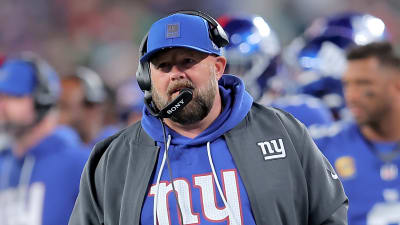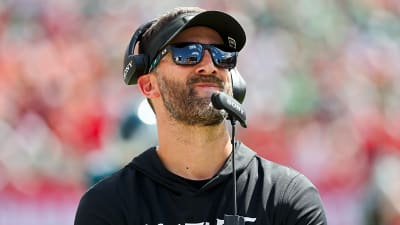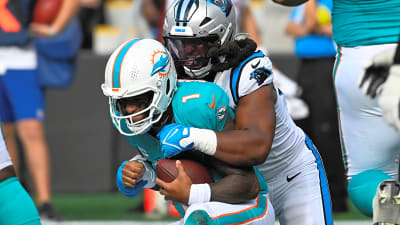
The Atlanta Falcons bounced back from their 30–0 loss to Carolina with an encouraging 34–27 win over the Commanders, showing signs of growth on offense while also handling adversity to push through during critical moments.
While issues in the secondary persist, strong play up front and balanced play-calling helped Atlanta avoid a 1–3 start.
Falcons Broke Predictability on Offense
Coming into the game, one of the biggest concerns around the Falcons’ offense was predictability. Atlanta had run the ball over 70% of the time in the pistol formation and over 90% of the time in the shotgun through three weeks.
Against Washington, they took a more balanced approach. The Falcons still leaned on the run out of pistol, but paired it with some more play-action looks to keep the defense on their toes. That balance helped open the field and gave Penix cleaner throwing windows, a noticeable difference from the mid-field congestion that limited them last game
The offensive line deserves credit, too. While veterans Chris Lindstrom and Jake Matthews have already established themselves, Matthew Bergeron and Elijah Wilkinson both had strong games.
While Bijan Robinson may have caught everybody’s attention with his explosive jump cuts on his 14-yard touchdown run in the 2nd quarter, Bergeron and Wilkinson sustained their blocks long enough to give Robinson enough time to be patient and wait for a crease to develop.
However, one notable concern from Atlanta’s offense was their route running. Outside of Drake London and Bijan Robinson, the Falcons struggled to gain much separation throughout the game (and throughout the season). Players like Darnell Mooney (who left the game with an injury) and Ray-Ray McCloud have explosive, big-play ability, but the Falcons have struggled to take advantage of one-on-one matchups outside of their top two offensive players.
Secondary Is Still a Problem
The secondary could have easily given the game away if they were facing a team with a strong passing attack. It was masked by Washington’s stagnant passing attack, but this could come back to hurt them if they face a more well-rounded offense.
Mike Hughes and Dee Alford both struggled when they were trusted in man coverage. Midway through the 4th quarter, Hughes had multiple passes caught on him as a result of his sluggish reaction time. At the beginning of the drive, Hughes gave up a first down after bailing early on a comeback route that Tay Martin hauled in for a first down. Later in the drive, Deebo Samuel caught him flatfooted while hauling in a fade route for a touchdown.
Dee Alford didn’t fare much better, getting beaten by Luke McCaffrey for a goal-line touchdown and often not reacting quickly enough to recover on sharp breaks from opposing receivers.
This was against a Commanders receiving corps that, without Terry McLaurin, isn’t exactly known for elite route-running. When Atlanta faces a team with more dynamic receivers, these issues could become a serious problem. If the corners don’t tighten up, Raheem Morris may have to lean harder into Cover 2 just to protect them.
Kyle Pitts Is Turning The Corner
After entering the league with expectations to be a generational tight end, Kyle Pitts is finally starting to deliver when Atlanta needs him most. On a crucial third down with the Falcons leading 31–24,
Pitts fought through physical coverage to haul in a deep out despite defensive pass interference. He also impeccably sold a play-action while chipping at the line before slipping out for a well-executed goal-line touchdown.
Through four games, Pitts is on pace for 85 receptions, 867 yards, and four touchdowns, which would be his highest catch total, second-most yards, and tied for most touchdowns in his career. If Sunday was any indication, Pitts may finally be emerging as the consistent target that the Falcons hope they landed when drafting him.
Defensive Front Shows Growth
The box score doesn’t fully show it, but Brandon Dorlus and David Onyemata were disruptive. On one key stop, Dorlus flattened his blocker and forced the run inside, freeing Onyemata to clean it up. Dorlus, in particular, flashed all game, collapsing pockets and playing with high energy. Rookie linebacker Jalon Walker also generated consistent pressure, even if it didn’t always end in tackles.
Penix Bounces Back
It wasn’t a perfect performance from Michael Penix Jr., but he was able to bounce back with a solid game after last week’s disaster. He avoided the catastrophic mistakes, completed throws under pressure, and played with more control. His most glaring error came when he tried to loft a pass over flat defender Mikey Sainristil, who baited him into throwing the corner route and caught an interception. Still, Penix’s confidence and toughness under pressure were obvious, and Atlanta’s improved play-calling seemed to give him an extra sense of comfort.
Special Teams Settle Down
After going 0-2 last week and continuing Atlanta’s season-long kicking concerns, Parker Romo rebounded nicely. He went 2-for-2 and moved to 7-for-7 on kicks indoors this season.
More From Atlanta Falcons on SI
More must-reads:
- Chiefs QB Patrick Mahomes reaches career milestone vs. Lions
- Injuries to monitor after Week 6: Fred Warner's brutal injury could decrease 49ers' Super Bowl chances
- The 'Most starts by an NFL quarterback' quiz
Breaking News
Trending News
Customize Your Newsletter
 +
+
Get the latest news and rumors, customized to your favorite sports and teams. Emailed daily. Always free!








